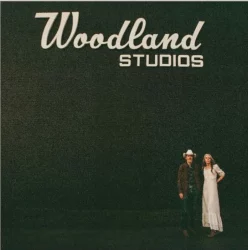
This folk duo have been woodshedding in Woodland. #seeingyournamewithahashtag
 Gillian Welch and David Rawlings have been presenting their brand of love songs for the loveless since Welch first eased into the folk landscape in 1996 on her “Revival” album. She and Rawlings have since teamed up for ten albums, though several are under her name alone. This latest was recorded at their Nashville studio, Woodland, also the title of the album, recently released on Acony Records. “The past four years were spent almost entirely within its walls, bringing it back to life after the 2020 tornado and making this record,” Welch offered. It does seem to carry a hint of cabin fever folk.
Gillian Welch and David Rawlings have been presenting their brand of love songs for the loveless since Welch first eased into the folk landscape in 1996 on her “Revival” album. She and Rawlings have since teamed up for ten albums, though several are under her name alone. This latest was recorded at their Nashville studio, Woodland, also the title of the album, recently released on Acony Records. “The past four years were spent almost entirely within its walls, bringing it back to life after the 2020 tornado and making this record,” Welch offered. It does seem to carry a hint of cabin fever folk.
The last time we heard from this duo was in 2020 when they put out a grab bag of covers and old folk songs with the ironic title, “All the Good Times.” The GRAMMY council seized on name recognition and bestowed its Best Folk Album award. Welch and Rawlings commented, “Woodland is at the heart of everything we do, and has been for the last twenty some years.”
Nothing much has changed since: Welch playing her Gibson J-50 while Rawlings accompanies her on his 1935 Epiphone and a panoply of other instruments. He sometimes crawls out too far on a tonal limb, but his inventive playing is the best thing “Woodland” has going for it on these ten recognizable songs. You don’t have to be born and raised on the mountain to sing about life there, but it had begun to feel like Welch hadn’t dropped in for a visit since “The Harrow & The Harvest” thirteen years ago.
Fans of Welch and Rawlings will be pleased to hear they have returned to a winning formula, except for those songs that they, for whatever reason, decided would be better served with a side of orchestration. It was a curious choice and doesn’t seem to jibe with their usual presentation.
The “Woodland” freight train leaves the station “chugging, plugging away cross the river trestle” on ‘Empty Trainload of Sky,’ which comes ‘round the bend with a mellow, plaintive sound that has a ring of J.J. Cale’s ‘Don’t Go to Stranger.’ Next up is ‘What We Had,’ where Rawlings takes the lead with his delicate, high voice bathed by strings. If you listen closely, you can hear the echo of my heart needs protection in the wistful melody. Rawlings fingerpicks his banjo-tuned guitar on the rustic, old-timey ‘Lawman,’ (not the powerful Grace Slick rocker) about the man with a badge patrolling a commonplace town steeped in poverty where “baby’s gonna cry, poor folk gonna scrap, preacher gonna preach, devil gonna laugh and lawman gonna kill my honey dead.” They go with a Sandy Denny-style Fairport Convention lament on ‘The Bells and the Birds’ with Rawlings playing Simon Nicol flourishes on acoustic guitar and Welch’s self-effacing queries to what a lover has heard. Some extended guitar noodling opens the drawn out ’North Country,’ which tells the story of a girl who can’t stand the cold and advises her would-be man that he’d better get his butt down where it’s warmer if he’s interested in some attention. The cold is a little bit hard on me, I gotta wait for the season to soften, Before I make the trip from Tennessee, Way up in the north country, I guess it’s just my blood getting thinner, This ain’t easy living no siree. It’s a decent song, really, and is possibly the first time ever “country” has been rhymed with “no siree.”
Some buoyant fiddle from Ketch Secor of Old Country Medicine Show is at variance with the bleak outlook of ‘The Day the Mississippi Died.’ The pair’s downhome harmonies blend nicely in a tale of a someone living the simple country life wondering about how the other half lives. “Way up on the Erie they like their chops so fat, I’ve seen the League of Women lick their fingers like a cat When out in California they like their soya beans I pretty much eat anything from soup to turnip greens.”
Rawlings lightens the mood on ‘Hashtag,’ a song that could have been so much more pleasing without the cheesy strings. Adding layers of orchestration to a simple arrangement is like painting a delicate water lily with pallid colors, drowning its natural beauty in a placid pond. They do offer a nice homage to one of their heroes in song, Guy Clark. You laughed and said the news would be bad If I ever saw your name with a hashtag Singers like you and I Are only news when we die.
‘Howdy Howdy’ closes the album with a statement of how their relationship works on both a musical and personal level. You and me always walk that lonesome valley You and me are always going to be howdy howdy. You almost expect Welch to break out the yodeling towards the end when they offer a nod to Kenny Baker’s old Spider Bit the Baby’ fiddle tune.
Welch and Rawlings’ albums come around about as often as a flower blooms in winter (seven years in this case), but the infrequency of their records does offer fans an opportunity to fully savor the old-time country songs about misfit outcasts and poor people resigned to asking little from life.


